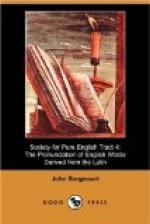STEMS IN -[=A]RIO. These follow the same rules, except that, as in ‘[’a]dversary’, combinations like ers are shortened and the stress goes back; and that words ending in _-entary_, such as ‘elementary’ and ‘testamentary’, stress the antepenultima. Examples are ‘antiquary’, ‘honorary’, ‘voluntary’, ‘emissary’. It is difficult to see a reason for an irregular quantity in the antepenultima of some trisyllables. The general rule makes it short, as in ‘granary’, ‘salary’, but in ‘library’ and ‘notary’ it has been lengthened. The N.E.D. gives ‘pl[=e]nary’, but our grandfathers said ‘pl[)e]nary’. Of course ‘diary’ gives a long quality to the i.
STEMS IN -[)I]LI. These seem originally to have retained the short i. Thus Milton’s spelling is ‘facil’ and ‘fertil’ while other seventeenth-century writers give ‘steril’. This pronunciation still obtains in America, but in England the words seem to have been usually assimilated to ‘fragile’, as Milton spells it, which perhaps always lengthened the vowel. The penultimate vowel is short.
STEMS IN -[=I]LI. Here the long i is retained, and in disyllables the penultima is lengthened, as in ‘anile’, ‘senile’, ‘virile’. There is no excuse for following the classical quantity in the former syllables of any of these words. As an English word ‘sedilia’ shortens the antepenultimate, like ‘tibia’ and the rest, the ‘alias’ rule not applying when the vowel is i.
STEMS IN -B[)I]LI. These mostly come through French and change the suffix into _-ble_. Disyllables lengthen the penultima, as ‘able’, ‘stable’, ‘noble’, while ‘mobile’, as in French, lengthens its latter vowel. Trisyllables shorten and stress the antepenultima, as ‘placable’, ‘equable’, but of course u remains long, as in ‘mutable’. Longer words throw the stress further back, except mere negatives, like ‘impl[’a]cable’, and words with heavy consonants such as ‘delectable’. Examples are ‘miserable’, ‘admirable’, ‘intolerable’, ‘despicable’. The Poet Laureate holds that in these words Milton kept the long Italian a of the penultimate or secondary stress.
Fall’n Cherube, to be weak is miserable.
In English we have naturalized _-able_ as a suffix and added it to almost any verb, as ‘laughable’, ‘indescribable’, ‘desirable’. The last word may have been taken from French. The form ‘des[)i]derable’ occurs from the fourteenth to the seventeenth century. Originally ‘acceptable’ threw the stress back, as in Milton’s
So fit, so acceptable, so Divine,
but the double mute has brought it into line with ‘delectable’. Nowadays one sometimes hears ‘disp[’u]table’, ‘desp[’i]cable’, but these are intolerable vulgarisms.
SUFFIXES IN T[)I]LI AND S[)I]LI. These words mostly lengthen the i and make the usual shortenings, as ‘missile’, ‘sessile’, ‘textile’, ‘volatile’, but of course ‘futile’. Exceptions which I cannot explain are ‘foss[)i]l’ and ‘fus[)i]le’.




